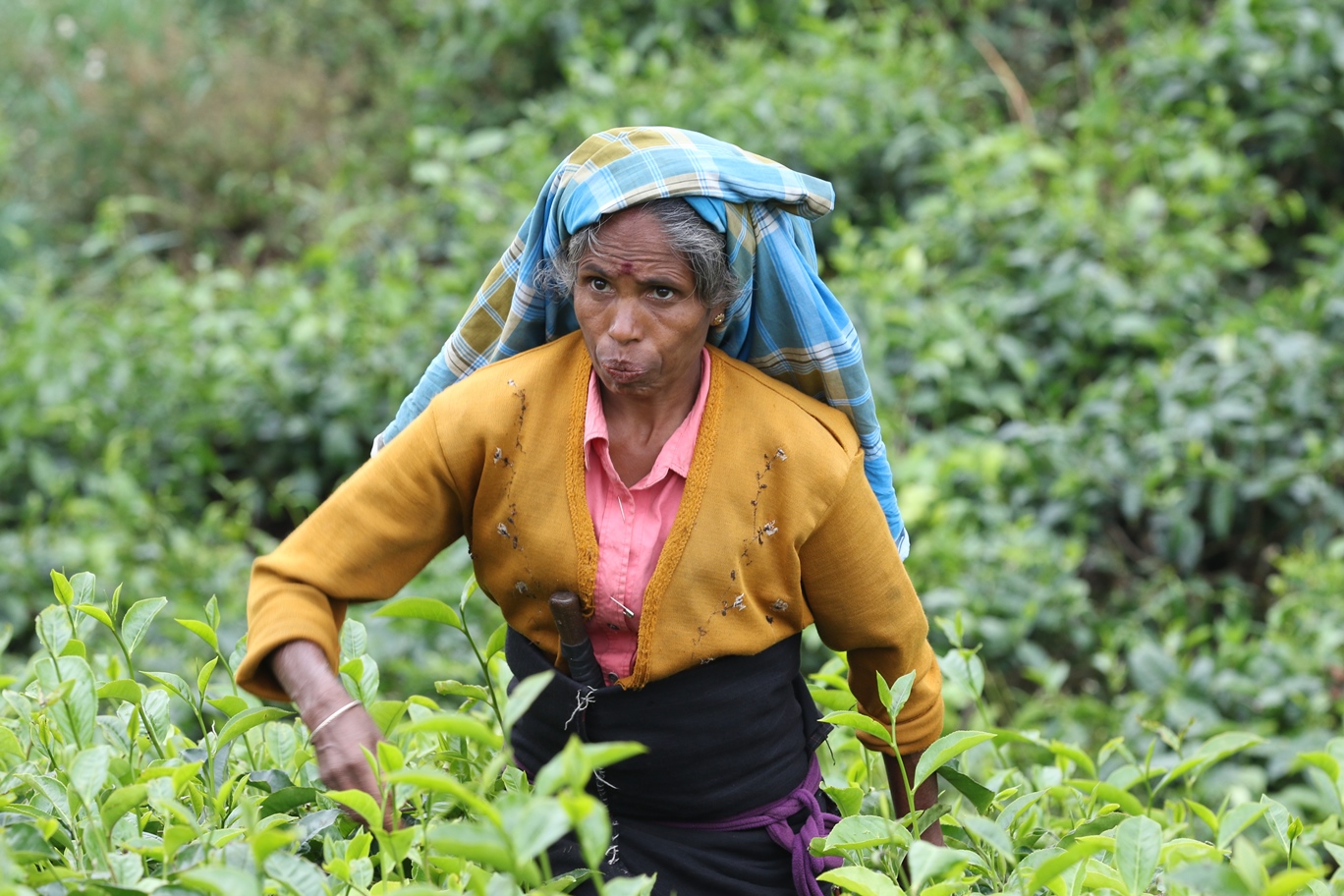Image: Majority of the up country Tamils are working in Tea plantations. (c).deshapriya.
Up-Country People (26)
08. The community, primarily Tamils of an oppressed caste from Southern India brought as indentured labour to work in Sri Lanka’s tea plantations (the Estate sector) by the British, has a long history of pervasive discrimination, exploitation and violence. A newly independent Ceylon perpetuated this through the 1948 Citizenship Act,27 which rendered the majority of the community stateless and disenfranchised.(28) With the last of the legislative amendments to correct the latter enacted only as late as 2009,29 the adverse effects have been intergenerational and the community remains amongst the poorest and the most excluded, though they have always been at the heart of one of the country’s most important economic sectors.
09. The exclusion of the Up-Country community is in fact underlined by the fact that the Estate sector is governed and classified as distinct from the Rural and Urban sectors. The legacy of being governed by companies rather than the State is reflected even today in the restrictions in the Pradeshiya Sabha Act of 1987 on the State and local authorities from providing certain infrastructure development services to Up-Country communities living at Estates.
10. According to data from the latest Household Income and Expenditure Survey (HIES 2012/13), the poverty headcount ratio in the Estate sector is 11 percent, higher than in the Rural (8 percent) and Urban sectors (2 percent). Only 2.2 percent have passed GCE (A/L), whilst in the Urban and Rural sectors the rates are 20.5 percent and 11.1 percent respectively. Multiple forms of deprivation are pushing Up-Country youth to give up education and join the labour force. Women in the Estate sector have the lowest Body Mass Index (BMI) in the country, indicating that despite a larger number of women from the Estates participating in the labour force, their labour has not reaped an escape from poverty.
11. Nearly 60 percent of the Estate sector live in ‘line rooms’, which not only bring stigma, but most of which are cramped, very old and result in reduced access to toilets or water, including safe drinking water within the household.(30) They also suffer from high levels of landlessness.
Additionally, activists underlined that there had been no systematic efforts to nurture and support the community’s traditional rituals and practices.
12. The Government has launched a ‘Ten Year National Plan of Action for the Social Development of the Plantation Community 2016-2025’. However, concerns have been expressed over a) the lack of emphasis on participation and social mobilisation, b) the longevity of the initiative given that it is only a scheme, and c) the long-term commitment to institutional and financial resources that can ensure not only its sustainability but also effective course correction.
13. A 2016 submission on behalf of the Malaiyaha Makkal (Up-Country People) to the Consultation Task Force on Reconciliation Mechanisms points out that the community risks being excluded from transitional justice processes. The submission highlights that on-going conversations around truth, reconciliation, justice and reparations have not taken into account the history of systemic violence faced by the community for almost 200 years, and side-line questions of economic exploitation and structural violence that have affected the community for far longer than the war.
Questions
1. Why does the Malaiyaha Makkal/Up-Country community continue to suffer from significantly unequal levels of education, healthcare, housing, water and sanitation relative to other sections of the country’s population? What specific time-bound measures/steps will the Government take to address this?
2. What measures will the Government take to ensure the full inclusion of the historical experiences of economic exploitation and violence experienced by the community in the transitional justice process?
Recommendations
1. Revisit the ‘Ten Year National Plan of Action for the Social Development of the Plantation Community 2016-2025’ to ensure social mobilisation and participation. Furthermore, ensure that the Plan is financially adequate, institutionally resourced and its implementation closely monitored to enhance effectiveness.
2. Replace the Citizenship Act No. 18 of 1948 with a new Citizenship Act that incorporates all amendments to the original Act, and amend section 33 of Pradeshiya Sabha Act of 1987 to enable local authorities to implement infrastructure development, such as Estate settlements and roads.
Foot Notes
26 Also referred to as Hill Country People or Tamils of recent Indian origin.
27 Citizenship Act No. 18 of 1948.
28 The Act was discriminative on two grounds: Firstly, for targeting the Upcountry Tamils as the Act required proof that their father or grandfather was born in Sri Lanka to qualify for citizenship under descent and secondly, the Act symbolised the passing of citizenship through the fathers and not through the mothers. See Kanapathipillai, V. (2009), Citizenship and Statelessness in Sri Lanka: The Case of the Tamil Estate Workers, London: Anthem Press, pp.42-45.
29 Periodic Report of Sri Lanka submitted under articles 16 and 17 of the ICESCR, due in 2013
30 According to the data from the Household Income and Expenditure Survey, 75.9 percent of households in the Estate sector have a toilet exclusive to the household compared to the national average, which is 89.9 percent). Only 67.4 percent of estate sector households have a source of drinking water within the premises while the data for Urban and Rural sectors is 92 percent and 79.6 percent respectively. For more, see Romeshun, K., & Fernando, P. (2015, May 07th), Poverty in the Estate Sector: Has it turned the corner?, The Island, Retrieved from: http://www.island.lk/index.php?page_cat=article-details&page=articledetails&code_title=124227 and see also Malaiyaha Makkal (Up-Country People) and Transitional Justice: A Submission to the Consultation Task Force on Reconciliation Mechanisms, available on file.
